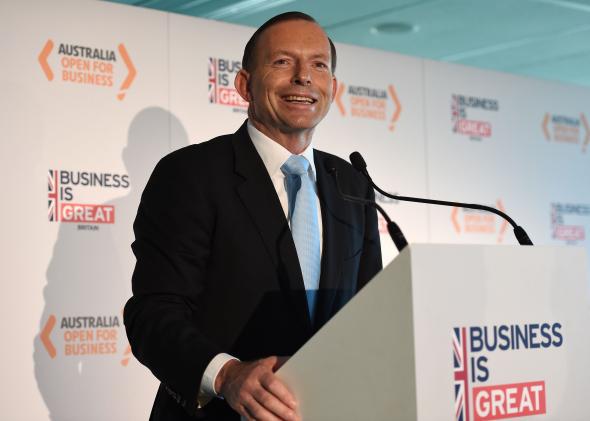Environmentalist protesters may be mocking him by sticking their heads in the sand of Bondi Beach, but it’s going to be tough for Australian Prime Minister Tony Abbott—leader of perhaps the world’s least green government—to ignore the topic of climate change as he welcomes his fellow world leaders to the G20 summit in Brisbane this weekend.
China and the United States surprised the other attendees earlier this week by announcing a major new climate accord on the eve of the summit. The White House has now followed up by announcing that President Obama will pledge between $2.5 billion and $3 billion over the next four years to the Green Climate Fund, an international effort to help poor countries address climate change. Japanese Prime Minister Shinzo Abe is also expected to pledge an additional $1.5 billion to the fund, an outlay that will likely be crucial in getting developed countries to sign on to an international climate treaty next year.
The Guardian reports that the pledges could “embarrass the G20 host country, Australia, which has been fiercely resisting climate change discussions” and “arguing against behind-the-scenes diplomatic efforts for G20 leaders to promise to make contributions to the fund.” Abbott, who has in the past questioned the science of climate change, has insisted that Australia will make no contributions to the fund, though Australia’s Department of Foreign Affairs and Trade says no final decision has been made.
Going forward from this weekend’s meeting, it will be interesting to watch the degree to which the Australian government’s environmental policies, which are at odds with most of the rest of the developed world, will isolate the country.
International climate diplomacy moves at a glacial pace—and unfortunately not as quickly as glacial melt—but the overall trend is toward a consensus that global warming is a major problem and steps should be taken to reduce emissions. In other words, Australia is drifting away from the pack.
Abbott’s government was criticized by fellow major economies after scrapping its pioneering carbon tax last July. Analysts say the country’s emissions rose significantly in the two months after the repeal, after a six-year trend of decline. The head of the U.K. Committee on Climate Change was particularly harsh, accusing Abbott of “recklessly endangering our future.”
While Abbott claimed at the time that emissions-trading schemes were being discarded left and right around the world, they are actually now in place in the EU, New Zealand, and large parts of the U.S., Canada, Japan, and China. South Korea plans to introduce one next year. The idea went mainstream just as Australia abandoned it.
Of course, Abbott probably isn’t sweating the criticism of European environmental ministers. And even if an international agreement is reached next year, it definitely won’t be tough enough to punish countries that don’t reduce their emissions.
But Abbott’s environmental policies have also committed Australia to an economic path that may not play out the way he anticipates. Moves like approving the world’s largest coal mine are predicated on the assumption that Asia’s booming economies will continue to have a voracious appetite for coal. That seemed like a reasonable assumption until recently, but China’s coal consumption may already be dropping and the country’s government seems increasingly serious about curtailing it. India, which could soon overtake China as the world’s largest coal importer, seemed like another reliable customer. But the country’s power and coal minister said this week that between ramped-up local coal mining and investments in alternative energy, India may phase out coal imports in two to three years.
That seems absurdly ambitious, and as my colleague Jordan Weissmann pointed out, coal markets didn’t seem too rattled by this week’s U.S.-China treaty. But being the world’s second-largest coal exporter doesn’t seem like the sure bet it used to be.
Abbott’s environmental policies, then, could lead Australia to greater isolation as other governments start taking climate change more seriously. Then again, depending on who is elected president of the United States in two years, he could quickly find himself back in the mainstream.
